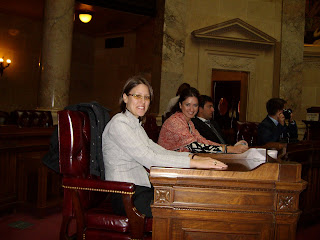12/10/09
The European regional project “Current social, political and economical problems for young European Political Leaders” will took place in the U.S.A from the 21st of September to the 9th of October. The target of the project was familiarise the young political leaders with the current social, political and economical problems on different levels – Federal, State and those which are connected to the local government in the United States of America. The attendants had the chance to gain better knowledge about the United States Foreign and State politics and the wide variety of factors and beliefs which form the shape of the plural politic of the United States. There was a special focus on the important role of the young in the political process and their influence in the new administration.
 The program was attended by European leaders from different spheres – politics, administration, business and media. Bulgaria was represented by Monika Panayotova – Chairwoman of MGERB and Member of Parliament in the 41st National Assembly.
The program was attended by European leaders from different spheres – politics, administration, business and media. Bulgaria was represented by Monika Panayotova – Chairwoman of MGERB and Member of Parliament in the 41st National Assembly.The program started in Washington, D.C. with a short walkthrough on American Federalism and a sightseeing tour of the U.S. Capital. The participants met with representatives from the Department of State and the Department of Defence and discussed their role in foreign politics as well as current affairs. A main topic was the relations between NATO and the European Union as well as the relations with Russia. The participants had the unique opportunity to visit the United States Department of Defense – The Pentagon where they discussed questions connected with international security concerning Iran and Afghanistan.
The group also met with lobbyists, academics and representatives from “Think Tank” organisations. They explained the role of the media and the lobbyists in America’s political and health care system. The main topic of discussion here was the reform in the health care system and the civil opinion on the matter. The International Economic Crisis was discussed as a chance for change. Change can happen when the market is rebalanced on the different levels – environment, finance, real economy, capital and labour force.
Among the participants in the program were Clyde Wilcox Ph D (Professor teaching Management in the Georgetown University), Congresswoman Linda Sánchez, David Cantor Ph. D (Managing Director with the Glover Park Group), Mr. Robert Moran (Executive Vice President at StrategyOne), Melanie Sloan (The Executive Director of Citizens for responsibility and ethics in Washington) and many more.
 After the conclusion of the program in Washington the group divided into three new separate groups and traveled in different directions. They traveled towards San Diego, California, Portland, Oregon and Seattle. The target of the division was to focus on different local governments, social and health care policy, education and civil rights. Participants in the regional program were local civil associations, non government organisations supporting immigrants, representatives from local associations, students and academic staff. Visits to small seaside towns from the West Side were also planned so the participants could meet the local population and discuss questions on state, national and global scale. The young leaders had the opportunity to stay overnight at local families from the seaside towns and exchange life experience.
After the conclusion of the program in Washington the group divided into three new separate groups and traveled in different directions. They traveled towards San Diego, California, Portland, Oregon and Seattle. The target of the division was to focus on different local governments, social and health care policy, education and civil rights. Participants in the regional program were local civil associations, non government organisations supporting immigrants, representatives from local associations, students and academic staff. Visits to small seaside towns from the West Side were also planned so the participants could meet the local population and discuss questions on state, national and global scale. The young leaders had the opportunity to stay overnight at local families from the seaside towns and exchange life experience.The group of Monika Panayotova went to Seattle. There they met the deputy mayor and representatives from the Council. They discussed the role of the local government as well as the upcoming elections for mayor in Seattle in November. Some other important questions were health care and education. A series of meetings took place with OneAmerica and El Centro de la Raza – organisations taking care of the problems of immigrants, discrimination and criminal activity of the minorities.
The young leaders visited the University of Washington and especially the wing dedicated to European Studies. They also visited a college in the small town of Roslyn where every participant introduced his country. Monika Panayotova introduced the political situation in Bulgaria and mentioned the fact that the role of the young people has greatly increased in the new Bulgarian government. She gave an example with MGERB whose members have become a valuable part of the executive and legislative government.
The groups met up in Madison, Wisconsin and in Milwaukee, Wisconsin where they learned about the role of the governments politic in the development of agriculture.
The program ended in New York. The main topic discussed there was the foreign policy of North America and particularly the relations with the EU, the American Mission to the UN and the policy concerning the Middle East region. Special attention was given to the conflict in Iran and Afghanistan and the role of NATO and the UN for its resolve. As an end to the event the whole group visited Broadway and had a tour of New York before heading home the next day.












